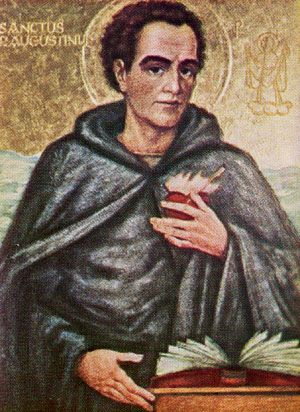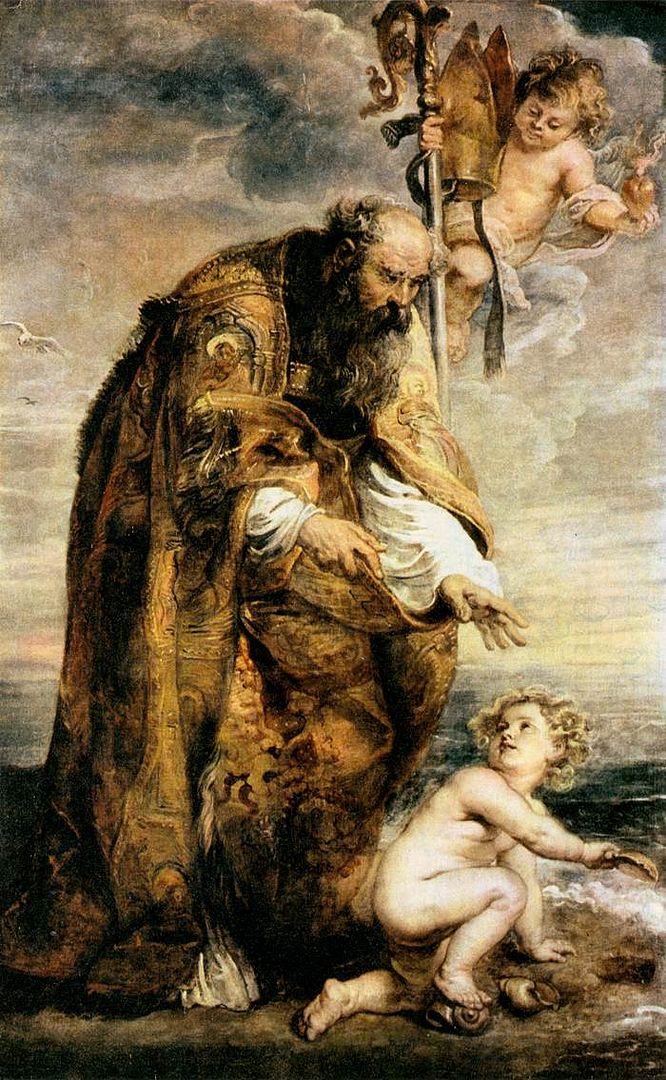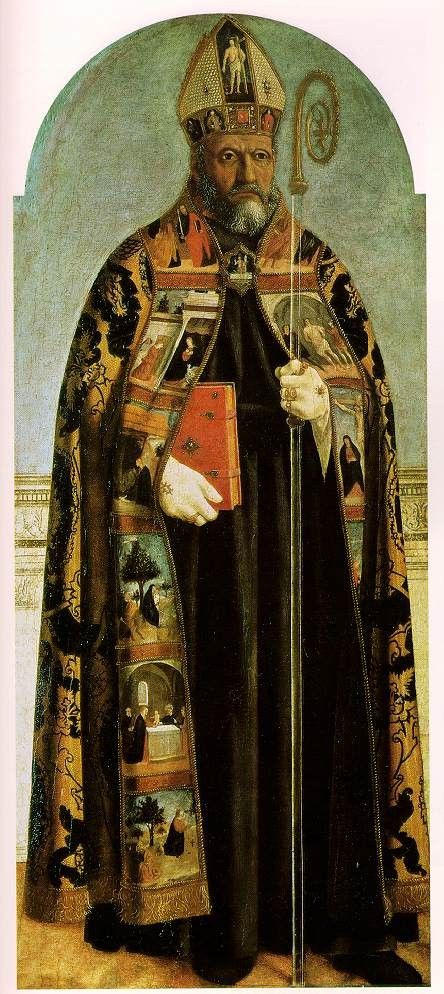"Lord, let me know myself, let me know thee."
"Our hearts are restless until they rest in Thee, O Lord"
Today, August 28, we celebrate the feast day of Saint Augustine of Hippo (354-430), bishop, confessor, Doctor of the Church, and one of the Four Great Fathers of the Latin Church. He is at times referred to as the Doctor of Grace. One of the most influential thinkers and writers of the Church, Augustine’s legacy in written works numbers at over 100 books, and 5,000,000 words! Within those words, the philosophy and virtues of our faith are revealed, inspiring us to a closer relationship with the Lord. The conversion of Saint Augustine, following years of sinful living, reminds us that we, too, are called to daily conversion… and that it is never too late to fully turn to the Lord!
From the Confessions of Saint Augustine:
“Too late have I loved you, O Beauty of ancient days, yet ever new! Too late I loved you! And behold, you were within, and I abroad, and there I searched for you; I was deformed, plunging amid those fair forms, which you had made. You were with me, but I was not with you. Things held me far from you—things which, if they were not in you, were not at all. You called, and shouted, and burst my deafness. You flashed and shone, and scattered my blindness. You breathed odors and I drew in breath—and I pant for you. I tasted, and I hunger and thirst. You touched me, and I burned for your peace”
Born Aurelius Augustinus in Tagaste, North Africa, Augustine was raised by his pious mother, Saint Monica (whose feast we celebrated yesterday) and a pagan father, Patricius, a city official. Though Augustine received thorough education in the Christian faith, and a solid Christian upbringing at the hands of his saintly mother, he led a dissolute life as a youth and young man. (His account may be found in the first nine Books of the “Confessions,” his most famous work chronicling his spiritual development and conversion.)
At age fifteen, Augustine took a mistress who bore him a son named Adoedatus (“the gift of God). At age 18, along with a friend, Augustine left the Christian faith and joined the Manichean heretical sect—a group which accepted the dual principle of good and evil. Considered a “religion of reason,” the Manichean gnosticism was popular with students of higher education, and as Augustine continued his studies in Carthage, he became increasing convinced of the truth and reason of the group’s beliefs. Manichaeism aimed to synthesize all known religions. Its basic dualistic tenet was that there are two equal and opposed Principles ("gods") in the universe: Good (Light/Spirit) and Evil (Darkness/Matter). As the late Archbishop Fulton J. Sheen explained, Augustine was attracted to the heresy for “practical” reasons: “The conflict between flesh and spirit in him was resolved by the heresy of Manichaeism because it enabled him to pursue a voluptuous life without ever being held accountable for it. He could say that the evil principle within him was so strong, so deep, and intense that the good principle could not operate.”
Augustine left his studies of law, and turned to literary endeavors. In the academic community, he won poetic tournaments and made a name for himself in the world of philosophy.
Augustine’s mother, Monica, was deeply bereft by his departure from the Christian faith, and prayed incessantly for his conversion and salvation. After nearly ten years as a Manichean, Augustine (now teaching in Milan) happened upon Saint Ambrose, Bishop of Milan, and began regularly attending his homilies. Through the moving preaching of Saint Ambrose, and the continued prayers of Saint Monica, Augustine came to believe in the truth of Jesus Christ as the only way to salvation. However, he was not ready to change his life and turn from his worldly lusts, praying (as he recounts), “Give me chastity and continence, but not yet.”
Augustine felt more and more torn between his lifestyle and the realization that Christ was the answer. Yet, he was convinced that he could not lead a pure and holy life, that he was slave to his bodily desires and worldly lusts. One day, however, after speaking with Pontitianus, an acquaintance who told him of the life of Saint Antony—a hermit who lived in the desert for over 70 years. After hearing the story, Augustine said: "Manes is an impostor. The Almighty calls me. Christ is the only way and Paul is my guide.”
Feeling ashamed of his life, Augustine exclaimed to his friends, "What are we doing? Unlearned people are taking Heaven by force, while we, with all our knowledge, are so cowardly that we keep rolling around in the mud of our sins!"
Full of sorrow and regret, Augustine fled to the garden, eager to be alone, warring within himself. He cried out to God, "How long more, O Lord? Why does not this hour put an end to my sins?"
As he spoke, Augustine heard a child in a neighboring house singing, "Take up and read!" Thinking that God intended him to hear those words, he picked up the book of the Letters of Saint Paul, and read the first passage his gaze fell on: the Letter of Saint Paul to the Romans (13:13):
"Not in rioting and drunkenness, not in chambering and wantonness, not in strife and envying; but put ye on the Lord Jesus Christ and make not provision for the flesh."
In that one moment, the carnal passions, which had for sixteen years he had believed to be invincible, were annihilated. Augustine described the events in the Confessions:
“I was greatly disturbed in spirit, angry at myself with a turbulent indignation because I had not entered thy will and covenant, O my God, while all my bones cried out to me to enter, extolling it to the skies. The way therein is not by ships or chariots or feet--indeed it was not as far as I had come from the house to the place where we were seated. For to go along that road and indeed to reach the goal is nothing else but the will to go. But it must be a strong and single will, not staggering and swaying about this way and that--a changeable, twisting, fluctuating will, wrestling with itself while one part falls as another rises.
I was ... weeping in the most bitter contrition of my heart, when suddenly I heard the voice of a boy or a girl I know not which--coming from the neighboring house, chanting over and over again, "Pick it up, read it; pick it up, read it." Immediately I ceased weeping and began most earnestly to think whether it was usual for children in some kind of game to sing such a song, but I could not remember ever having heard the like. So, damming the torrent of my tears, I got to my feet, for I could not but think that this was a divine command to open the Bible and read the first passage I should light upon. ...
So I quickly returned to the bench where Alypius was sitting, for there I had put down the apostle's book [Paul's letter to the Romans] when I had left there. I snatched it up, opened it, and in silence read the paragraph on which my eyes first fell: "Not in rioting and drunkenness, not in chambering and wantonness, not in strife and envying, but put on the Lord Jesus Christ, and make no provision for the flesh to fulfill the lusts thereof."[Romans 13:13] I wanted to read no further, nor did I need to. For instantly, as the sentence ended, there was infused in my heart something like the light of full certainty and all the gloom of doubt vanished away.”
At 33, Augustine came to Christ, after 17 years of prayer by his mother. "Too late, O Ancient Beauty, have I loved Thee,” he cried out, firm in his new convictions. Several weeks later, he resigned his professorship, and devoted himself to Christian philosophy—the only true belief system he could conceive of. He was baptized by Saint Ambrose, and following his full initiation into the Church, decided to return to North Africa with his mother. Saint Monica, as we read yesterday, died in Ostia, the port of Rome, and following her burial, Augustine returned to North Africa.
Augustine committed himself to living a life of poverty, prayer, and scriptural study. It was in Hippo that the majority of his works were written, including:
“Lord, before whose eyes the abyss of man’s conscience lies naked, what thing within me could be hidden from you, even if I would not confess it to you? I would be hiding you from myself, not myself from you. But now, since my groans bear witness that I am a thing displeasing to myself, you shine forth, and you are pleasing to me, and you are loved and longed for, so that I may feel shame for myself, and renounce myself, and choose you, and please neither you nor myself except because of you.
Therefore, before you, O Lord, am I manifest, whatever I may be. With what profit I may confess to you, I have already said. When I am evil, to confess to you is naught else but to be displeased with myself; when I am upright of life, naught else is it to confess to you but to attribute this in no wise to myself. For you bless the just man, O Lord, but first you justify him as one who has been ungodly. Hence my confession is made in silence before you, my God, and yet not in silence. As to sound, it is silent, but it cries aloud with love. Nor do I say any good thing to men except what you have first heard from me; nor do you hear any such thing from me but what you have first spoken to me.”
Despite it never being Augustine’s intention to become a priest, he was ordained by the local bishop as he was praying in church. Living in Tagaste, the city of his birth, he founded a monastery according to the Augustinian Rule, and preached against heresy with great impact. At the young age of forty-two, he was appointed bishop of Hippo, a position he served for thirty-four years.
Saint Augustine died at the age of seventy-five. His contribution to and influence on Catholic doctrine and thought-- and on Christian belief and piety-- is incalculable. Survived by his written works—among them the Confessions and City of God—Augustine continues to challenge, captivate, and inspire us nearly sixteen hundred years after his death.
"Great art thou, O Lord, and greatly to be praised; great is thy power, and infinite is thy wisdom." And man desires to praise thee, for he is a part of thy creation; he bears his mortality about with him and carries the evidence of his sin and the proof that thou dost resist the proud. Still he desires to praise thee, this man who is only a small part of thy creation. Thou hast prompted him, that he should delight to praise thee, for thou hast made us for thyself and restless is our heart until it comes to rest in thee. Grant me, O Lord, to know and understand whether first to invoke thee or to praise thee; whether first to know thee or call upon thee. But who can invoke thee, knowing thee not? For he who knows thee not may invoke thee as another than thou art. It may be that we should invoke thee in order that we may come to know thee. But "how shall they call on him in whom they have not believed? Or how shall they believe without a preacher?" Now, "they shall praise the Lord who seek him," for "those who seek shall find him," and, finding him, shall praise him. I will seek thee, O Lord, and call upon thee. I call upon thee, O Lord, in my faith which thou hast given me, which thou hast inspired in me through the humanity of thy Son, and through the ministry of thy preacher.
The contribution of Saint Augustine to the Catholic faith is beyond description. His writings on free will and grace have shaped the doctrine of the Church for centuries. Over the course of the next week, I will post daily writings of Saint Augustine, Great Doctor of the Church!
Lord, renew in your Church the spirit you gave Saint Augustine.
Filled with this spirit, may we thirst for you alone as the fountain of wisdom and seek you as the source of eternal love.
We ask this through our Lord Jesus Christ, your Son, who lives and reigns with you and the Holy Spirit, one God, for ever and ever. Amen.
Inspired by the origins and spiritual history of the Holy Rosary, we continue our meditation on the psalms, one each day, in order, for 150 days.
Psalm: Psalm 125: The Lord the Protector of Israel
1 Those who trust in the LORD are like Mount Zion,
which cannot be shaken but endures forever.
2 As the mountains surround Jerusalem,
so the LORD surrounds his people
both now and forevermore.
3 The scepter of the wicked will not remain
over the land allotted to the righteous,
for then the righteous might use
their hands to do evil.
4 Do good, O LORD, to those who are good,
to those who are upright in heart.
5 But those who turn to crooked ways
the LORD will banish with the evildoers.
Peace be upon Israel.
Day 240 of 365
Prayer Intentions: True daily conversion; For those who have converted in faith, or are considering joining the Church.
Requested Intentions: For employment and health of mother (G); Successful employment (M); Restoration of a family, End to brother's addiction, Successful marriage (R); Employment (I); Successful recovery of a mother; for all stroke victims (D); Improved relationship with daughter (P); Restoration of health and successful marriage (A); Health and employment for a friend (G); Restoration of health (M); Answers to prayers (A); Conversion of son and family (S); Successful business, home purchase, health of brother (SJ); Successful delivery of a baby girl (U); Successful return to the faith (A); Emotional, physical, and financial healing (D); Diagnosis and recovery (A); For a successful relationship (J); Those suffering from depression (J); Successful adoption (S); Healing of a father battling cancer (S).
Psalm: Psalm 125: The Lord the Protector of Israel
Why pray the Rosary every day for a year?
Each time the Blessed Virgin has appeared-- whether it be to Saint Bernadette Soubirous at Lourdes; to Lucia, Jacinta, and Francisco at Fatima; or to Mariette Beco at Banneux-- she has asserted the importance, saving grace, and power of praying the Holy Rosary on a daily basis. Based upon her words, the Rosary is penance and conversion for sinners, a pathway to peace, an end to war, and a powerful act of faith in Jesus Christ. Pope Paul VI presented the Rosary as a powerful means to reach Christ "not merely with Mary but indeed, insofar as this is possible to us, in the same way as Mary, who is certainly the one who thought about Him more than anyone else has ever done."
To show us how this is done, perhaps no one has been more eloquent than the great Cardinal Newman, who wrote: "The great power of the Rosary consists in the fact that it translates the Creed into Prayer. Of course, the Creed is already in a certain sense a prayer and a great act of homage towards God, but the Rosary brings us to meditate again on the great truth of His life and death, and brings this truth close to our hearts. Even Christians, although they know God, usually fear rather than love Him. The strength of the Rosary lies in the particular manner in which it considers these mysteries, since all our thinking about Christ is intertwined with the thought of His Mother, in the relations between Mother and Son; the Holy Family is presented to us, the home in which God lived His infinite love."
As Mary said at Fatima, "Jesus wants to use you to make Me known and loved. He wishes to establish the devotion to My Immaculate Heart throughout the world. I promise salvation to whoever embraces it; these souls will be dear to God, like flowers put by Me to adorn his throne."

Subscribe to:
Post Comments (Atom)






















0 comments:
Post a Comment
Thanks for leaving a comment. If you wish to submit a prayer request, however, please do so above, using the "Contact" tab.